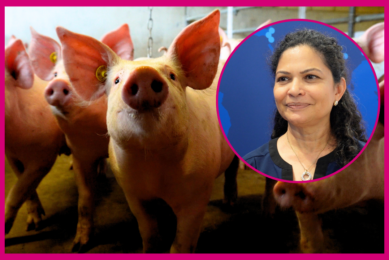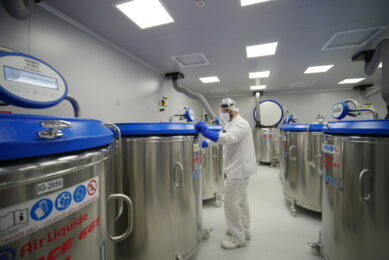Pig farm biosecurity, are we doing it right? Ask Jeroen!

Belgian veterinary scientist Jeroen Dewulf and his team have been at the forefront of biosecurity in pig farms for the last 10 years, training veterinarians and producing very innovative tools to reduce disease in farms. Expert Edgar Garcia Manzanilla discusses some of his thoughts from following Jeroen’s advice in daily practice.
Have you ever wondered… why is it recommended to wait 48-72 hours between pig farm visits? How important is to shower in and out when visiting a farm? Or, what is the optimum time to rest a house after cleaning and disinfection?
In early April 2018, we were lucky to have Jeroen Dewulf answer all these questions and many more during a training session for veterinarians in Ireland. Jeroen is a veterinarian passionate about biosecurity and has made huge progress in this area by reviewing even the basics principles of biosecurity.

The book recently edited by Jeroen Dewulf is a good bedside read if you are interested in biosecurity. Photo: Edgar Garcia Manzanilla
I think it is worth sharing some of his recommendations here and get everybody thinking… how good is my biosecurity?
Animals are always the main risk
Biosecurity in pig farms would be the combination of all measures taken to reduce the risk of introduction and spread of disease. With this in mind, we should always remember that the main risk for introduction or spread of disease in a farm is the pig itself. They are by far the best vehicle to transport disease because most viruses and bacteria need the pig to survive.
Read more about pig health in the Pig Progress Health Tool
Some tips for good pig farm biosecurity:
• Always prioritise measures to reduce the contact between diseased and healthy animals.
• If you buy gilts from an external farm, focus on having a very good quarantine. This is a must!
• Keep an eye on the semen source too. They should do regular checks of their animals and inform you.
• Avoid trucks entering your farm when transporting carcasses and sows.
• Create barriers between the different stages of production to reduce recirculation of disease.
Once these basics are done, start thinking about other aspects.
Everybody on the pig farm should understand ‘risk’
In too many cases farmers, advisors and other professionals have told me that they do not understand the rules of biosecurity. They think it is unrealistic to think that you can avoid disease to enter a farm by using such measures. I would agree with that, no doubt.
Biosecurity is not about avoiding disease entering the farm, it is about reducing the risk, in other words, reducing the probability that it happens. Risk zero is very difficult to achieve but reducing risk is something very easy to do.
You may not be able to wash your hands every time you move from one stage of the farm to another, however if you can do it 5 times a day out of 10 that will reduce the probability of spreading disease significantly. It is that sort of mind set that will make biosecurity work and it needs to be spread among farm stuff.

Be realistic, go one step at a time
For me, the success of Jeroen’s team is related to the practical and realistic approach they took. They created a very simple tool that is available online for free, Biocheck.Ugent.
The tool assesses biosecurity on farms and benchmarks the results to other farms, the main aspects to be improved are identified and then it is up to the farmer and the veterinarian to set realistic targets for improvements. Once the targets are achieved the process starts again. Simple and effective. Give it a try. More than 5,000 pig farms have already done it.
To be continued…
The system does not work in every single farm you use it but in average it improves biosecurity, reduces the need for antibiotics and, most importantly, has a positive effect on farmer’s pocket. We started using it 3 years ago and the farms used as pilots have already significantly improved their performance. Now we are extending the methodology to a wider number of farms.
As you see it is still work in progress but very promising. I will be back with more details in future opinions. And no, I did not forget to answer the questions I asked at the beginning of this text. I leave those for you to give your views in the comments. It will be a good discussion for sure!











